Sudan
This painting keeps him alive”: Maïssa Omar’s voice chokes when she recalls her son Walid, a demonstrator killed in June in Khartoum, now immortalized by a portrait on the wall of the family home.
The portrait is the work of Assil Diab. This Sudanese artist launched a campaign of murals and graffiti in memory of the demonstrators killed in the repression of the protest in Sudan.
Walid Abdelrahim was killed in a three-day civil disobedience movement in response to the June 3 brutal dispersal of a sit-in that killed dozens of demonstrators and injured hundreds more.
“When I see this painting, it gives me strength. I am proud to be the mother of a martyr,” Mrs. Omar confessed, looking at the face of her son painted on the wall of their house in Bahari, Khartoum’s northern district.
According to doctors close to the protest movement, 246 people have been killed across the country since the beginning of the demonstrations triggered in December by the tripling of the price of bread in the midst of an economic slump.
Marked by the dismissal of President Omar al-Bashir on 11 April and brutal repression, demonstrations continued, with protests demanding that the military transfer power to a civilian government.
“Immortalize their legacy”
“Our martyrs are not dead, they live among the revolutionaries” is this slogan of the protesters that motivated and inspired Assil Diab, 29, and her team.
“The idea is to immortalize their legacy in their own homes and make the inhabitants of their neighbourhood proud of a martyr who sacrificed his life for Sudan,” said the former employee of the Qatari news channel, Al-Jazeera.
“Graffiti will bring the martyrs back to life and preserve their memory among people, whether or not they supported the revolution,” she added.
A high price for the revolution
Each graffiti costs him about 570 euros to make, the prices of the necessary products and tools are high.
“But the martyrs took to the streets and died for us. This is the minimum we can do for them,” says Ms. Diab, who has painted about 30 portraits of demonstrators killed in Khartoum.
In Sudan, graffiti was for years a clandestine art, considered by the security services as a symbol of counter-power or as outright vandalism, while there was vigorous censorship.
But everything changed on April 6, when thousands of demonstrators gathered outside the army’s headquarters in Khartoum, despite tear gas fire, to demand that President Bashir be deposed by the military.
The day after this gathering, artists began to sketch drawings on the walls of the capital.
Bahari, a high place of protest, has become the favorite canvas of graffiti artists.
A portrait on the blue wall of a youth club depicts the face of Mohamed Mattar. Killed like dozens of other demonstrators on June 3 in the repression of the sit-in outside army headquarters, Mattar quickly became an icon of protest.
A portrait on the blue wall of a youth club depicts the face of Mohamed Mattar. Killed like dozens of other demonstrators on June 3 in the repression of the sit-in outside army headquarters, Mattar quickly became an icon of protest.
“This painting makes me want to demonstrate so that the demands of those who died for us can be satisfied,” explains Moujahid Sadek, a resident. “I didn’t know Mattar, but we all know him now.”
An experiment which turned deadly
A student in Britain, Mattar had returned to visit his family and had barely celebrated his 26th birthday when he decided to spend a night at the sit-in.
His murder inspired a campaign of solidarity on social networks with the hashtag #blueformattar.
“We decided to paint his face here because it is a vast area where as many people as possible can see it,” says Eythar Gubara, a member of Ms. Diab’s team.
Some of Ms. Diab’s works also represent demonstrators killed during the September 2013 crackdown on anti-austerity rallies.
Among these faces, that of Babikir Anwar, painted on a wall of the family home in the Chambat district.




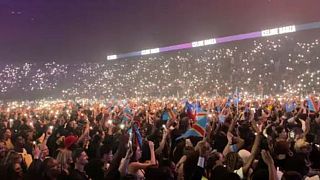
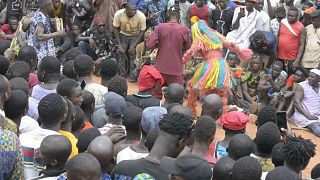
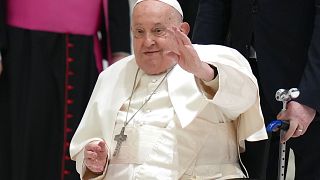
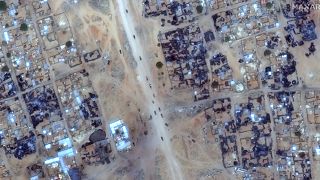
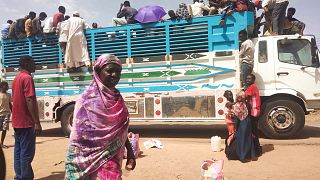
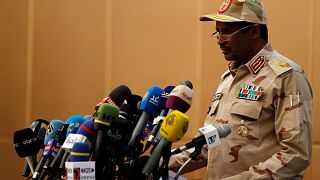



Go to video
Sudan: World Food Programme warns of hunger crisis, asks for more funding
Go to video
Dozens flee deadly RSF attacks in north Darfur as camps suffer heavy losses
Go to video
Sudanese Al Hilal aims for victory against Al Ahly in the CAF Champions League quarter final clash
Go to video
Khartoum residents welcome army soldiers who reclaimed area from RSF
Go to video
Pics of the day: March 27, 2025
Go to video
Pics of the day: March 24, 2025